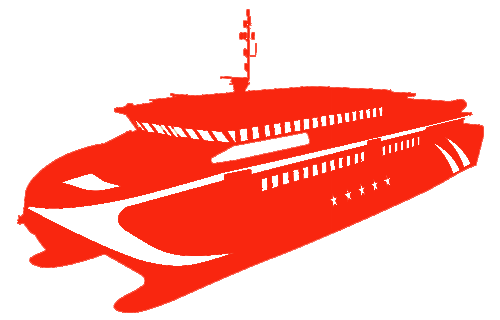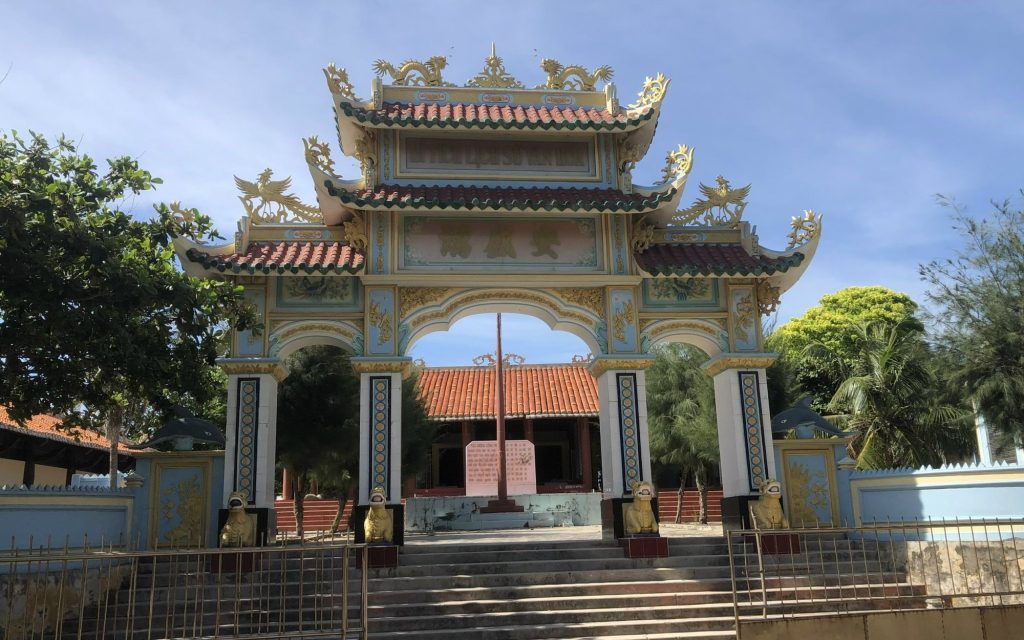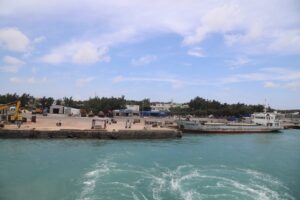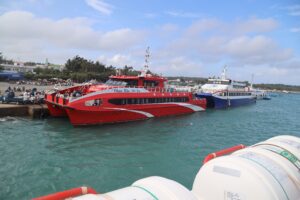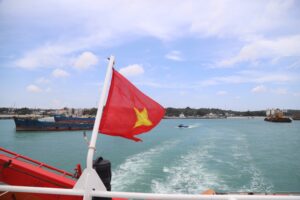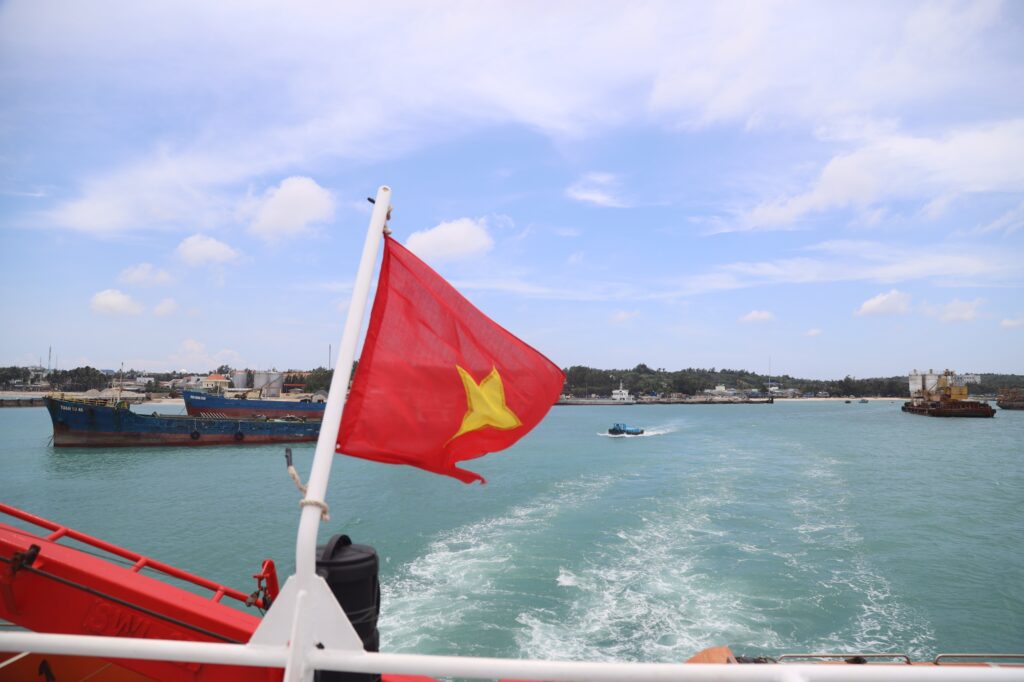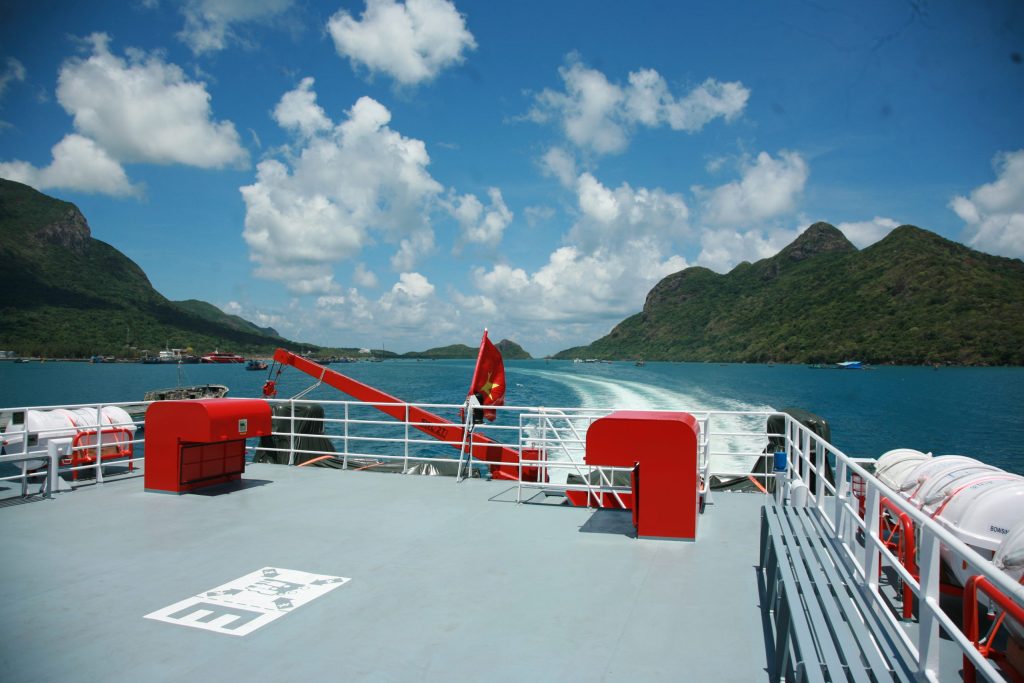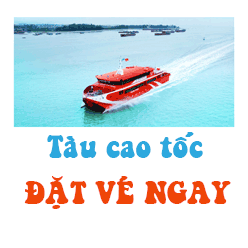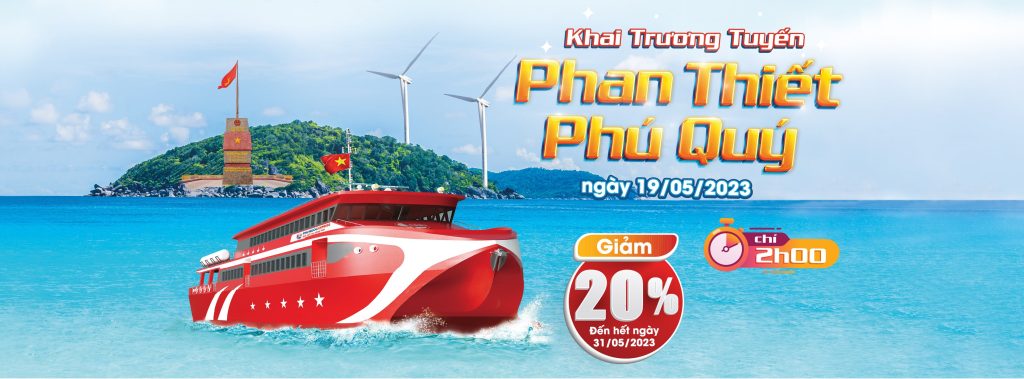Van An Thạnh is located on a white sandy beach right by the sea in Trieu Duong Hamlet, Tam Thanh Commune. The name “Van An Thạnh” expresses the wish for a peaceful and prosperous life of the local fishing community here. The Van worships the Whale God (“Ca Ong”) as well as the village’s tutelary deity (Thanh Hoang) and the village ancestors (Tien Hien and Hau Hien).
While in agricultural regions, the Dinh (communal house) is the traditional cultural institution of the village, coastal fishing and island areas have the Van. Both the Dinh and the Van worship the local tutelary deity and ancestors. However, the Van is a unique form strongly imbued with fishing-related spiritual beliefs; the Thanh Hoang deity in the Van plays a secondary role, with the main worship directed to the Nam Hai God (God of the South Sea).
History of Van An Thạnh
Van An Thạnh was established in the year Tan Suu (1781), making it the oldest Van compared to others in Phu Quy. From a humble original structure—a wooden frame with thatched roof and leaf walls—it has been developed with government support and contributions from local people into a spacious, solid, and well-maintained building with a cool, clean, and beautiful surrounding environment.
The components of the Van exhibit unique artistic features deeply reflecting the maritime culture of the Vietnamese people. The embossed decorations—dragons, phoenixes, fish, squid, floral patterns—and the system of horizontal panels and couplets showcase the skillful craftsmanship and creativity of the island community accumulated over hundreds of years, attracting many visitors to the island.
The Van also preserves the skeleton of a Sperm Whale, measuring over 17 meters long with 50 vertebrae and 30 pairs of teeth on the lower jaw. According to legend, the whale weighed about 40 tons when it washed ashore. The skeleton has been restored and is currently displayed in the Whale Skeleton Exhibition House within the Van’s grounds.
Besides its traditional folk cultural values, Van An Thạnh is a maritime cultural museum nearly 250 years old, housing many collections of whale and leatherback turtle specimens. It ranks among the oldest maritime museums in the world. In recent years, many oceanographic researchers and foreign tourists have shown great interest in the preservation of relics at Van An Thạnh.
Besides the main object of worship—the Whale God (“Ca Ong”)—Van An Thạnh also venerates the village’s tutelary deity and ancestors, similar to the communal houses in mainland villages.
Van An Thạnh stands as a witness of the island’s long history. Its historical, cultural, artistic, and folk literary values will be inherited and further developed, retaining positive aspects and gradually eliminating negative ritual practices, ready for a smooth transition to future generations. Van An Thạnh was classified as a National Monument by the Ministry of Culture and Information under Decision No. 51/QD/BT dated January 12, 1996.
Major Annual Commemoration at Van An Thạnh
Historical records state that in 1841, a large Whale God was stranded and died on the beach in front of Van An Thạnh. The people of Phu Quy organized its burial. Because this whale was the largest and heaviest, locals have commemorated it every year on the 15th day of the 10th lunar month—the day it was discovered stranded—with a memorial ceremony and gathering.
Besides rituals related to fishing beliefs, Van An Thạnh also hosts important village and communal activities such as meetings, boat races, and monthly or annual traditional opera performances (hat boi) to entertain the community.
During festivals, islanders working far away often return to Van An Thạnh to offer incense in gratitude to the Whale God. They also meet to exchange business news from the past year and enjoy traditional opera performances.
Fishing Prayer Festival at Van An Thạnh
A common spiritual cultural feature among the 10 Vans on the island is the annual fishing prayer festival, though the scale and timing vary. Van An Thạnh, having been established earlier and with comparative historical and cultural advantages, is considered the foremost Van in all aspects on the island. Therefore, all ceremonies and festivals held here carry great significance for the island’s community.
The fishing prayer festival at Van An Thạnh was held on May 7-8, 2013 (28th-29th day of the 3rd lunar month), marking the major anniversary of the Whale God’s death and burial. This longstanding festival is held every year with solemn grand rituals. The main focus is restoring the ceremony of a boat procession at sea to welcome the God of the South Sea (Ong Sanh) back to the Van. The ceremonies begin at 7 PM on May 7 (28/3 lunar) and conclude at 1 PM on May 8 (29/3 lunar). Nearly 20 rituals take place in sequence, starting with the proclamation ceremony, deity welcoming, ancestor welcoming, and the arrival of the Nam Hai God. All rituals are conducted strictly and respectfully by the ceremony committee.
The most impressive moment is the welcoming of the Nam Hai God from the sea to Van An Thạnh. At the appointed time, the fleet of boats sails out in formation, creating a magnificent and grand spectacle. After the ritual, everyone feels fulfilled, believing the God has heard their prayers and quietly follows the boats back to the festival. The return journey features a beautifully arranged boat formation.
Through this fishing prayer festival, the unique cultural features of the island’s festivals are introduced to visitors; cultural and festival activities are effectively exploited for tourism promotion and development, contributing to diversifying tourism tours in Binh Thuan province from a cultural tourism perspective, attracting more domestic and international visitors to Phu Quy Island.
During the festival, various traditional folk art forms such as ritual folk songs and “hat cheo ba trao” opera performances—unique to Phu Quy fishermen—are showcased, attracting participation and appreciation from the fishing community. Islanders working afar eagerly return to contribute financially to ensure the festival’s success and vibrancy. The fishing prayer festival is a time to strengthen community bonds, expressing deep respect and gratitude toward sea deities and ancestors, embodying the Vietnamese traditional ethic of “Drinking water, remember its source.”
Visiting Van An Thạnh on Phu Quy Island, tourists will learn about the Whale God worship customs of local fishermen, as well as the island’s maritime cultural values expressed in worship spaces and traditional festivals preserved through generations. This helps us understand an important part of the island’s history and the unique spiritual beliefs connected to the livelihood environment of the local fishermen.


